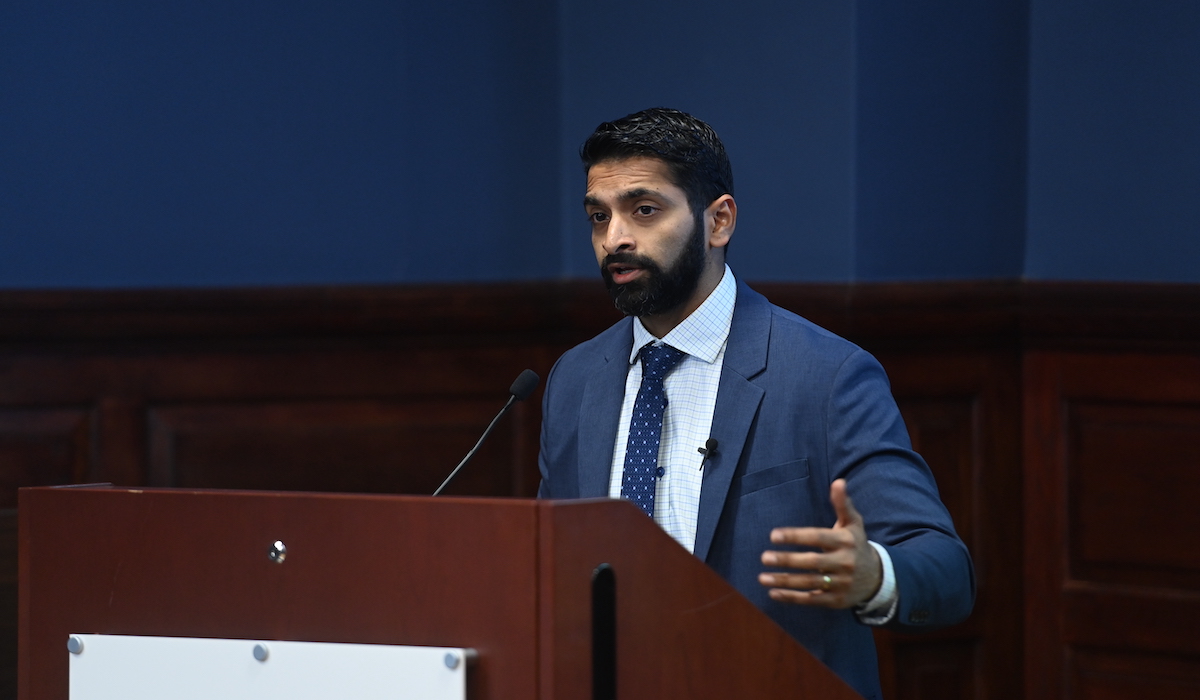

Catholic priests in the United States overall are “flourishing” and strongly support the child protection policies put in place by the U.S. bishops, but they also fear false allegations and their trust in the nation’s bishops has significantly declined.
These were among the initial findings of the largest study of U.S. priests undertaken in 50 years presented by Brandon Vaidyanathan, associate professor of sociology and lead researcher of the National Study of Catholic Priests, and Stephen White, executive director of The Catholic Project, which sponsored the study, during an Oct. 19 event that also was live-streamed.
The researchers found that 77% of priests and 81% of bishops are “flourishing,” according to the Harvard Flourishing Index used in the study. Priests also reported finding strong social support from lay friends, family, and parishioners. At the same time, signs of concern included higher burnout indicators among younger priests.
An impetus for the study was a conversation between a bishop and John Garvey, former University president, about the bishop’s concern that his priests were less likely to come to him with personal struggles after the Charter for the Protection of Youth and Young People, the 2002 U.S. bishops’ document that established strict national protocols for child protection.
“This intuition seems to have some truth to it,” White said.
The study showed a significant decline in trust by diocesan priests toward their bishop — from 63% in 2001 to 49% in 2022. Only 36% of diocesan priests responded that their bishop would help them “very well” if they went to him with a personal struggle compared to 93% of bishops who responded that they would.
As White put it, “This discrepancy is significant and I hope it will help the bishops understand the need to better express their support for priests.”
The study took place from January to June 2022 and involved a census of Catholic bishops in the U.S., a survey of 10,000 priests (religious and diocesan), and qualitative interviews with over 100 priests. Religious priests showed higher confidence — 67% — in their major superiors.
“We recognize the serious damage that clergy sexual abuse and its cover-ups have caused to victims. Most priests agree with the Church’s response to the abuse crisis, yet many priests also are living in fear of false allegations and feel their bishops wouldn’t have their backs if they were falsely accused,” Vaidyanathan said.
In fact, 82% of priests reported that they regularly fear a false allegation.
“Living in constant fear of a life-ending accusation definitely puts a cloud over the priesthood. And honestly, I think most priests have that,” one priest interviewee told researchers.
Vaidyanathan said that priest respondents indicated that a no-tolerance approach to the abuse of a minor is “absolutely necessary,” but priest responders also said that a lack of clarity around the addition of “vulnerable persons” (adults) combined with a perceived lack of due process are contributing to the priests’ fears. Only 51% of diocesan respondents felt their bishop would support them if falsely accused; 86% of religious priests felt their major superior would support them in that situation.
“It is important to know how priests are doing and that priests are struggling, and important to heal the culture of cynicism in dioceses and create a healthier system of trust,” Vaidyanathan said.
The study includes recommendations from priests on steps that bishops or religious superiors could take to establish or strengthen trust with their priests. These include strengthening personal relationships with priests, more transparency in decision-making and more clear and open communication.
Founded in the wake of the sexual abuse crisis, The Catholic Project fosters collaboration between the clergy and the laity to identify and address strategic challenges facing the Church in the United States. This includes education and formation programs, research, events, and media. As part of its work to address the abuse crisis in the Church, The Catholic Project previously released the nationally acclaimed “Crisis” podcast and has developed an online certificate in child safety and safe environments.